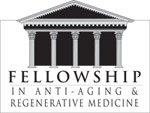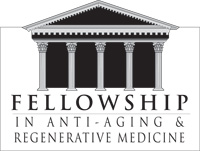9031
0
Posted on Jun 09, 2009, 6 p.m.

This modular training program includes hands on clinical training and web broadcasts to discuss topics and experience with other trainees and experienced clinicians. Open to physicians, physician assistants, nurse clinicians and pharmacists, participants will leave the fellowship competent to practice anti-aging and regenerative medicine without supervision in his or her medical speciality.

What is the Fellowship in Anti-Aging and Regenerative Medicine?
This modular training program includes hands on clinical training and web broadcasts to discuss topics and experience with other trainees and experienced clinicians. Open to physicians, physician assistants, nurse clinicians and pharmacists, participants will leave the fellowship competent to practice anti-aging and regenerative medicine without supervision in his or her medical speciality.
What is Anti-Aging Medicine?
Anti-aging medicine is a clinical/medical specialty and field of scientific research aimed at the early detection, prevention, treatment, and reversal of age-related decline. It is well documented by peer-reviewed medical and scientific journals and employs evidence-based methodologies to conduct patient assessments. The American Academy of Anti-Aging Medicine was established in 1997 as a professional physician certification and review board, which offers physician recognition in the form of specialty-based examination in Anti-Aging Medicine. It represents 12,500 physicians, scientists, health professionals, and the health minded public from 73 countries worldwide.
What is Regenerative Medicine?
Regenerative Medicine optimizes the body's endogenous mechanisms of self-repair and adds proven and near future exogenous treatments and technologies. Adult stem cells appear to be our most powerful tool at this time. Previous dogma concerning adult stem cells taught that neurons and myocytes did not have stem cells and the cells present at birth just declined in quantity and quality. It was also believed that hematopoietic stem cells in the bone marrow lacked plasticity and could not transform to other tissues. Current medical literature proves that adult stem cells exist in most tissues including brain, heart, muscles and liver. Hematopoietic stem cells (HSC) and endothelial progenitor cells (EPC) in the bone marrow have plasticity to potentially transform and repair all tissues and organs.
- In the hormone optimization component of Anti-Aging Medicine we are already optimizing stem cells. Progesterone via its metabolite allopregnenolone stimulates neural stem cells, testosterone stimulates muscle stem cells and EPC's which can improve erectile function, and growth hormone treatment for adult growth hormone deficiency improves the quantity and quality of EPC's. Estradiol improves incorporation and mobilization of EPC's.
- In the lifestyle component of Anti-Aging medicine we are optimizing our adult stem cells with exercise and control of glucose and insulin.
- In the neutraceutical component of Anti-Aging Medicine we are optimizing our adult stem cells with Resveratrol as we turn on genes such as SIR1 and with blueberry, green tea and vitamin D3. DHA in omega 3 fish oil promotes neurogenesis from neuronal stem cells
A new phase of Regenerative Medicine has recently commenced with cryogenic preservation of adult stem cells in healthy patients for future use. These patients are the same pro-active population who follow Anti-Aging programs. After stimulation with granulocyte colony stimulating factor adult stem cells can be collected by aphaeresis and stored in separate aliquots for treatment of specific pathologies such as acute myocardial infarction or for overall immune system reconstitution. This paradigm shift is referred to as bio-insurance.
What is Functional Medicine?
Functional Medicine is an integrative, science-based healthcare approach that treats illness and promotes wellness by focusing on the bio-chemically unique aspects of each patient, and then individually tailoring interventions to restore physiological, psychological, and structural balance. Functional Medicine focuses on understanding the fundamental physiological processes, the environmental inputs, and the genetic predispositions that influence health and disease so that interventions are focused on treating the cause of the problem, not just masking the symptoms. There are seven basic principles underlying functional medicine which include the following:
- Science-based medicine that connects the emerging research base to clinical practice.
- Biochemical individuality based on genetic and environmental uniqueness.
- Patient-centered care rather than disease-focused treatment.
- Dynamic balance of internal and external factors that affect total functioning.
- Web-like interconnections among the body's physiological processes also affect every aspect of functionality.
- Health as a positive vitality, not merely the absence of disease.
- Promotion of organ reserve.
Criteria for completion of the fellowship includes completion of:
8 module series with extensive case histories:
- Module I: A Regenerative and Functional Approach to Endocrinology
- Module II: A Regenerative and Functional Approach to the Treatment of Hypertension, Diabetes, and Coronary Artery Disease and Metabolic Syndrome
- Module III: A Regenerative and Functional Approach to Gastroenterology, Neurotransmitters, and Neurology
- Module IV: A Regenerative and Functional Approach to Amino Acid and Fatty Acid Metabolism, Drug Induced Nutrient Depletion, ADD/ADHD, Spirituality, Osteoporosis, and Nutrition
- Module V: Clinical Intensive: Case Studies in Anti-Aging Medicine and Implementation of these Treatments Modalities into Everyday Practice
- Module VI: Nutrigenomics and The Functional Regenerative Matrix
- Module VII: Mitochondropathy, Advanced Nutrigenomics, A Regenerative and Functional Approach to Autoimmune Diseases and Cognition Enhancement
- Module VIII: Genomics and Proteomics, A Regenerative and Functional Approach to Psychiatry and Cancer Therapies, Nutrition and the Athlete, A Regenerative and Functional Approach to Laboratory Evaluations
- Selected Readings
- 40 Interactive web broadcasts with leading professionals in Anti-Aging and Regenerative Medicine
Additional features
- Participant will leave the fellowship competent to practice Anti-Aging and Regenerative Medicine without supervision in his or her area of medical speciality.
- Participant will be involved in web broadcasts so that he or she will have an on-going feedback from experienced clinicians.
- Extensive case-studies will be included with each module.
- Open to physicians, physician assistants, nurse clinicians, pharmacists, chiropractors and D.D.S.
For more information call 1-800-558-1267 or visit the A4M Fellowship website.
![]() Download Program: Fellowship in Anti-Aging and Regenerative Medicine
Download Program: Fellowship in Anti-Aging and Regenerative Medicine
![]() Download 2009 Fellowship Schedule: Fellowship in Anti-Aging and Regenerative Medicine
Download 2009 Fellowship Schedule: Fellowship in Anti-Aging and Regenerative Medicine
![]() Download 2010 Fellowship Schedule: Fellowship in Anti-Aging and Regenerative Medicine
Download 2010 Fellowship Schedule: Fellowship in Anti-Aging and Regenerative Medicine









